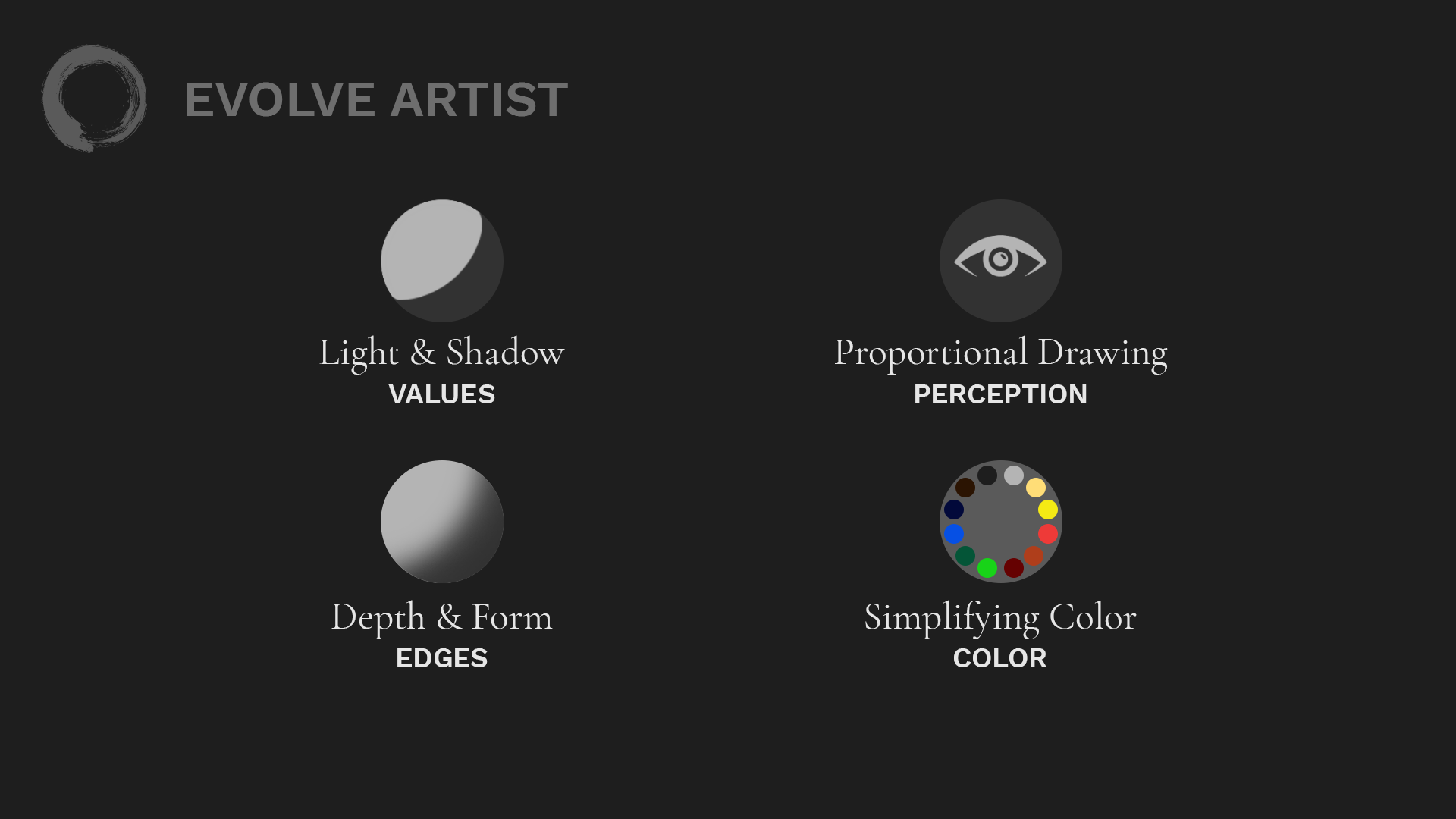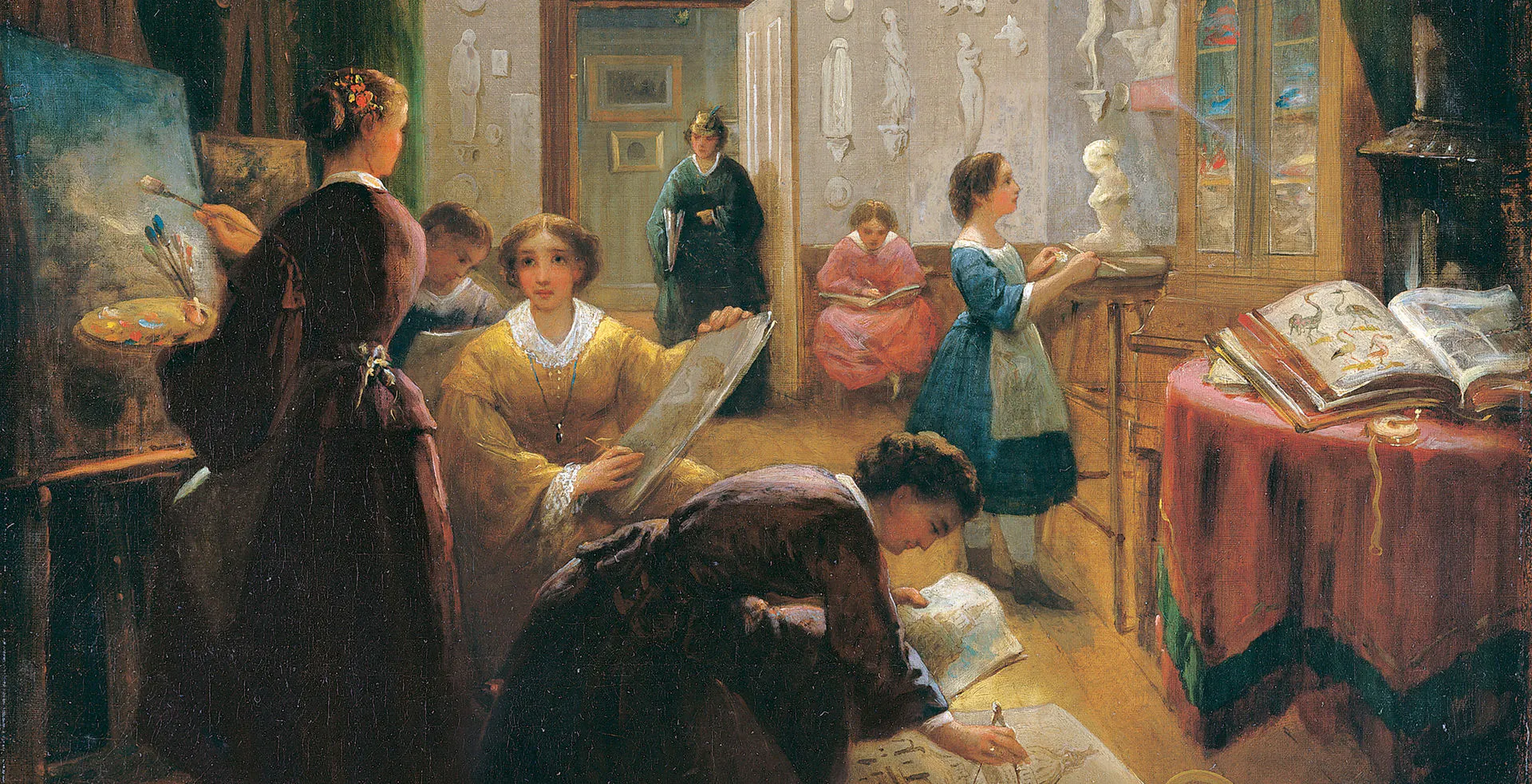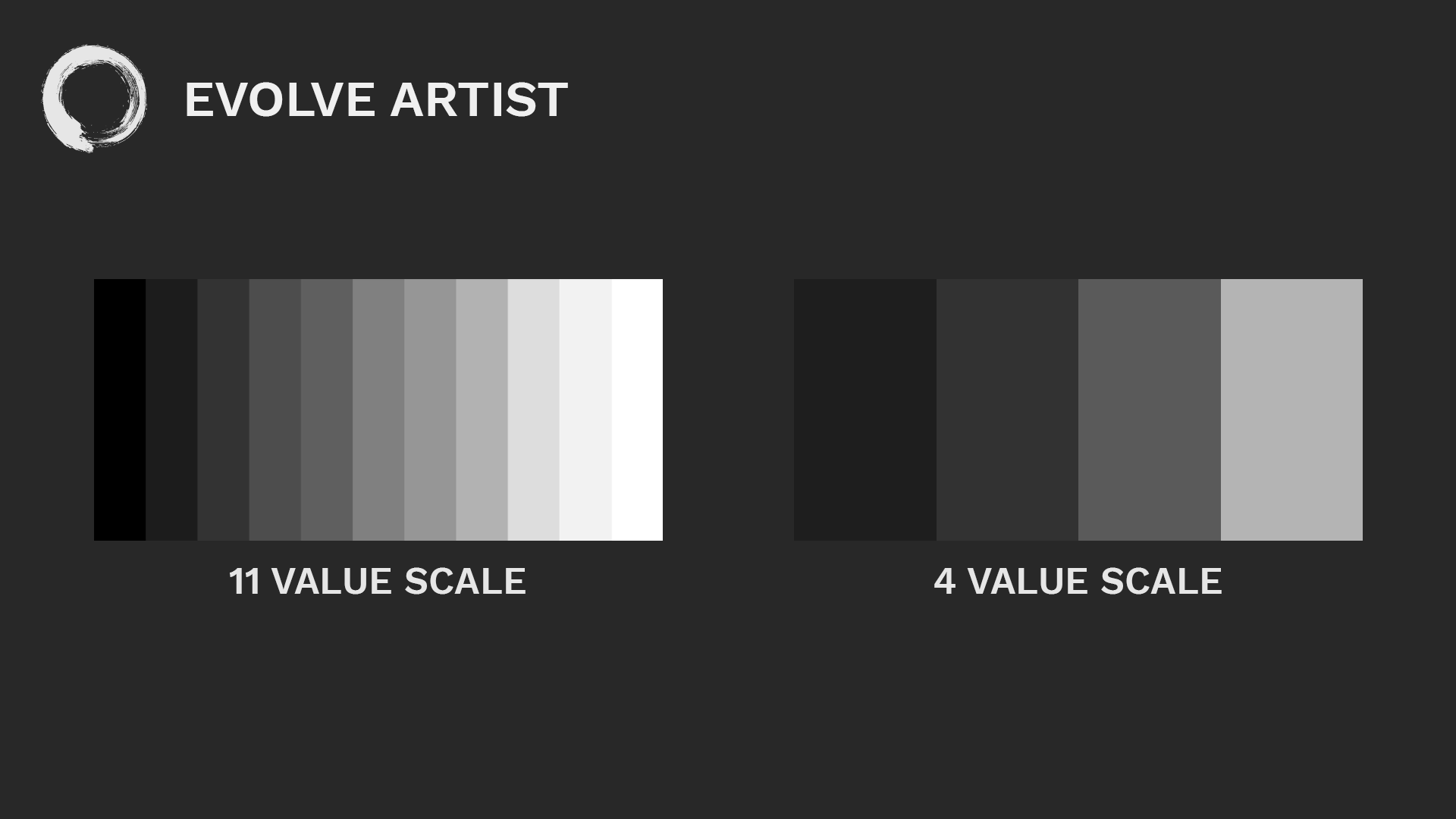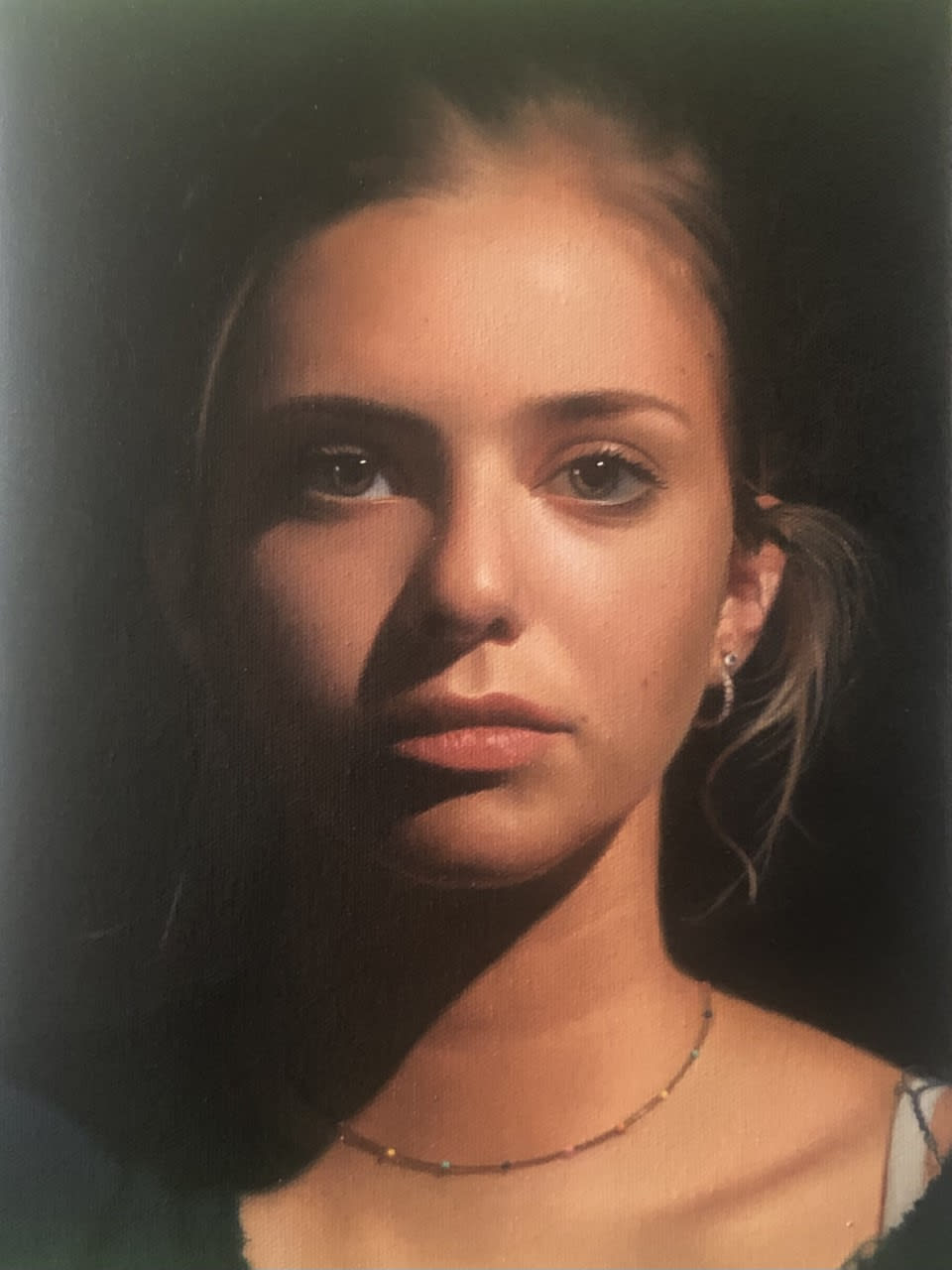Are you an aspiring artist looking to get professional art skills fast? With the right plan and dedication, anyone can make the leap from amateur to pro artist. We take our students from beginner to pro-level art in a year with just seven hours of practice a week.
That’s five times faster than the norm.
That's not a lot of time to go from knowing nothing to producing professional-level paintings.
How do we do it?
It has nothing to do with natural talent.
Our students focus on what matters and skip everything else. What we teach goes against the grain of what’s often taught at traditional art schools and ateliers – and we’re sharing it with you.
Here are the 3 things you need to know to get professional art skills fast.

Evolve student Craig H was able to get professional art skills in just 4 blocks as shown in this 'before' and 'after'
1. To get professional art skills, master technical skills first
Have you been taught to just ‘paint what you see’? Or that technical art training limits creativity? Art students are picking up their brushes everyday hoping “natural talent” will show them the way to creative expression.
This doesn’t work for everyone, and art should be accessible to everyone.
The reality is ‘natural talent’ isn’t a replacement for technical training. The fundamentals aren’t reserved for master artists. Technical art skills can be and should be taught to beginners. In fact, learning art without technical mastery can limit your creativity because you don’t have the skills you need to express your idea. It can also mean it takes longer to learn the essentials because you’re learning through trial and error.
Think about art as a language. What you could you possibly say if you couldn’t speak the language properly?
Kevin Murphy
Evolve Artist Founder & Master Portraitist
Like any form of communication, art is a language. You’ve got to learn the alphabet first before you can write poetry. You don’t jump into poetry on day one - if you tried, you’d be learning the language the hard way, no matter how beautiful the poetry is in your head.
Instead, you master the alphabet, all of it, not 23 or 25 letters, but all 26. You then start with a very small vocabulary and the words get bigger and bigger, from one word to two to three, and so on. Your teacher guides you and corrects your spelling and grammar. And eventually, you learn how to compose your thoughts, add your own flair, and create poetry.
Art is no different.
Instead of 26 letters, there are three fundamental skills for art - value, color, and edge. We use our perception (Evolve's fourth fundamental) to use value, color, and edge to create realistic art. Once these skills are developed, there are no limits. Anything you can imagine can be created and brought to life.

Evolve's Four Fundamentals of Art: Values, Edges, Color, and Perception
Want to know more?
CLICK HERE to hear why Learning Art is Like Learning a Language [YouTube]
CLICK HERE to read why You Need to Start with Realism
CLICK HERE to learn more about The 4 Fundamentals of Art
2. Don’t be tied to tradition. Streamline the process.
Do what you need to do to master a skill, and then move on. Don’t labor over different mediums or countless exercises. They take up precious time and offer no significant benefit.
In an atelier, mastering drawing and painting skills can take years because they’re going about it more tediously. It isn’t necessary to do 100 different exercises in three different mediums to master a single artistic technique.

In traditional ateliers, students often don’t touch a paint brush for years. Credit: Women’s Art Class by Louis Lang, 1868
If we teach someone to defend themselves, we wouldn't teach them every single skill to become a black belt in Ju Jitsu. Learning beautiful footwork would ultimately take a long time when the fundamental three or four skills of defense could be learned very quickly.
It’s the same for art. Strip down what you’re learning and master each skill, and then move on.

Evolve Artist uses a Four-Value Scale instead of 11 because it is simpler and just as effective.
Evolve uses a simplified four-value grayscale, instead of 11. Why? Because beginner students don't need to master 11 values, they just need to master four. Developing skill in the remaining seven values comes with experience.
Evolve used to offer charcoal drawing, and … we got rid of it.
Teaching drawing skills with charcoal took our students a long time, with very little benefit. We found students could develop drawing skills using a brush, and fill a space in 30 seconds instead of 30 minutes with charcoal.
When we realized that everything that was being taught in charcoal could be taught with paint, and faster, it was a no-brainer.
If it doesn’t meaningfully help you master a skill, drop it.
Want to know more?
CLICK HERE to learn Why We DON'T Teach Drawing Before Painting [YouTube]
3. Put in just seven hours a week to get professional art skills
Once you’ve focused on the fundamentals and streamlined the process, the rest is up to YOU.
If you put in consistent effort, you can create professional art. At Evolve, we recommend seven hours a week over a year to produce professional level work. Natural talent not required.
In an atelier, you can work on a single bargue drawing for months. One drawing, weeks, months. You start thinking, ‘I'm never going to get there’. It can shatter your confidence. It leads to overwhelm, and ultimately a longer and inaccessible journey for the average art enthusiast. It’s not your fault.
It’s effective to focus on the fundamentals and streamline the process because it reduces the barriers to learning art, like time or needing to get into exclusive art schools or ateliers.
Once those obstacles are taken away it is easier for YOU to put in the time to see progress and build your experience at your pace.

This beautiful portrait is an excellent example of how Evolve students like Caitlin H could get professional art skills fast. This was painted over a single month.
After you've got the skills, you can use your art as a creative outlet more efficiently. Experienced artists spend the rest of their lives getting better and more nuanced. Building your creativity and expression will come along the way with consistent effort.
Bringing it all together
If you’re already putting in seven hours a week into your art, but are feeling like you don't have the ‘talent’ to produce professional level art, Evolve is for you.
We’ve done the hard work and developed a streamlined guided experience so anyone can be a successful artist. It doesn't require ‘natural talent’, 4 years of costly art school, or charcoal drawing for a years.
Every step of the way, we’re building your confidence with real instructors and a supportive online community.
Want to know more about how Evolve develops professional artist skills fast? CLICK HERE for our mini-course Oil Painters for Beginners to get a taste of what Evolve is all about. CLICK HERE to read a review of our course.
Are you ready to take your skills to the next level? Join Evolve Artist HERE.
Happy Painting!
